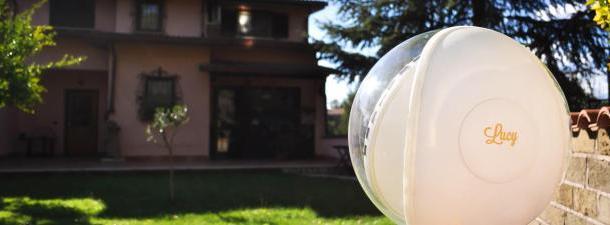Diva Tommei, from Italy, is the creator of this sphere that, thanks to an algorithm, follows the sun’s movement and captures and reflects its light into rooms to prevent any increases to the electricity bill. The design was created neutrally mesh with all types of interior decorations. Financed by a crowdfunding campaign, it has far exceeded its initial goal.
The half white and half transparent sphere, which looks to have come from a not too distant future, sits on a patio in front of a small window looking into a bedroom. The sun shines luminously, and the gadget, like a sunflower, relies on all that free energy. Lucy (as the sphere is called), while it relies on the light, also projects it into rooms, which in turn don’t need any other means for heating or lighting.
Lucy is the creation of entrepreneur Diva Tommei. From Italy, she has a PhD in Molecular Biology from the University of Cambridge, and return to Italy after finishing her studies in order to launch the project. The sphere, which measures 40 centimetres in diameter and weighs some 3.5 kilograms, raised more than 360,000 dollars (some 325,000 euros) through the crowdfunding campaign. That is 600% more than the initial goal.
The way Lucy works is very simple: a mirror reflects sunlight and projects it into a room to heat and light it.
Diva Tommei, in the grey blouse, creator of the Lucy startup and the Solenica team. | Image: Courtesy of Solenica.
“Lucy’s purpose is to allow natural light into your house throughout the day”, Tommei explained to Think Big. “The way of doing this is with reflection by this intelligent mirror”. According to the engineer, Lucy is capable of lighting a room of up to 46 metres squared, or the equivalent of 13 60-watt light bulbs. Thus eliminating the need to turn on any lights during the day.
The only thing the user must do is place this “intelligent mirror”, as Tommei calls it, which is wind and rain resistant, pointing towards the room one wishes to light, either inside the room or out (it is very easy to move around). The robotic mirror will follow the sun like a sunflower and project its light into the room.
In addition, it is capable of modifying its reflection angle to receive either more or less light. “It can follow the sun anywhere you place it and can stay there the whole day reflecting light”. An algorithm performs calculations for the mirror to move according to the sun’s movement, thereby receiving the light and projecting it outwards.
An Italian-designed sphere
The idea for Lucy was born “out of necessity”, when Tommei was preparing her doctorate in the United Kingdom, and “spending too much time in dark offices”. So, “I initially built Lucy to solve my own problem”. The prototype recalls the idea of a heliostat, a mirror that allows the sun’s rays to be directed to a single point, which turns with small movements so that the light always falls in the same place.
Visitors started to notice her curious solution. “People began to ask me if I could build one for their house. That made me think there could be a market for this”. So she decided to create a startup, Solenica. Once again in her native country, Tommei decided to develop the invention and give it an “Italian” touch, as the advertising says, as its part white and part transparent clean, minimal aesthetic won’t detract from any room or decoration style.
Lucy’s pre-sale price is 199 dollars (179 euros). The spheres are assembled in the country and are fully autonomous, with no need to be plugged in: they operate on the same solar energy that they send outwards to the room.
Solar energy without electricity
For Tommei, considered one of the 50 most influential women in the European entrepreneur scene by the website EU Startups, Lucy is “something different”, since she allows light and heat into the house with consuming electricity. This is ideal for our planet, in which 17% of the population has difficulties accessing electric energy, according to the International Energy Agency. Therefore, Tommei is hoping that in the future the product will be available at minimum costs to be accessible to emerging markets. Additionally, the team promises that Lucy can reduce each person’s carbon footprint by up to one tonne per year.
The sphere can be used both inside and outside. | Image: Courtesy of Solenica
“The vision of the startup is to bring light into people’s homes. I think that what really worries us is having this incredible energy source available to us and not using it. We build walls to protect ourselves [from it] when we can use it to improve our lives”, she explains. This way, people could recover their “relationship with the natural elements”.
When it comes to advertising Lucy, Solenica highlights the benefits of sunlight: it helps produce serotonin, a hormone associated with happiness and well-being. The companies also states that more sun increases productivity, while not forgetting that it helps save on the electrical bill. And it doesn’t look like the energy source will dry up any time soon, unlike oil…
As Tommei explains it, in the past five years, Italy has experienced “a huge explosion” of solar panels: “There was a huge bubble, facilitated by Government incentives”. However, as soon as the subsidies disappeared, the bubble popped and people stopped installing solar panels. Her company is focusing on a new phase with improved development of that solar energy boom: without giving away too many details, she mentions that the team already has other sustainability-related products in mind. Meanwhile, she and her colleagues are getting ready to deliver the first spheres and to help us all make good use of the sun’s wealth.









